Related Research Articles

"With a Little Help from My Friends" is a song by the English rock band the Beatles, from their 1967 album Sgt. Pepper's Lonely Hearts Club Band. It was written by John Lennon and Paul McCartney and sung by drummer Ringo Starr, his lead vocal for the album. As the second track on the album, it segues from the applause of the title track.

"You Won't See Me" is a song by the English rock band the Beatles from their 1965 album Rubber Soul. It was written by Paul McCartney and credited to Lennon–McCartney. As with songs such as "We Can Work It Out" and "I'm Looking Through You" from the same period, the lyrics address McCartney's troubled relationship with Jane Asher and her desire to pursue her career as a stage and film actress. The Beatles recorded the song during what author Mark Lewisohn describes as a "marathon" final recording session for Rubber Soul, to ensure the album's pre-Christmas release.
"Drive My Car" is a song by the English rock band the Beatles, written primarily by Paul McCartney, with lyrical contributions from John Lennon. It was first released on the band's 1965 album Rubber Soul as the opening track. The song later appeared in North America on the Yesterday and Today collection, again to open the record, as the track had been dropped from the American version of Rubber Soul.
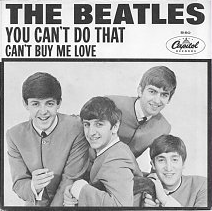
"You Can't Do That" is a song written by John Lennon and released by the English rock band the Beatles as the B-side of their sixth British single "Can't Buy Me Love". It was later released on their third UK album A Hard Day's Night (1964). A live rendition of the song was released on the 2016 re-release of The Beatles at the Hollywood Bowl.
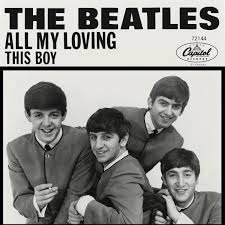
"This Boy" is a song by the English rock band the Beatles, written by John Lennon (credited to Lennon–McCartney). It was released in November 1963 as the B-side of the band's Parlophone single "I Want to Hold Your Hand". In the United States, it was issued in January 1964 on Meet the Beatles! which was Capitol Records' reconfigured version of the With the Beatles album. The Beatles performed the song live on 16 February 1964 for their second appearance on The Ed Sullivan Show. An instrumental easy listening arrangement by George Martin, re-titled "Ringo's Theme (This Boy)", was featured in the film A Hard Day's Night and the United Artists soundtrack album. This version was also issued as a single, reaching number 53 in the US and number one in Canada.
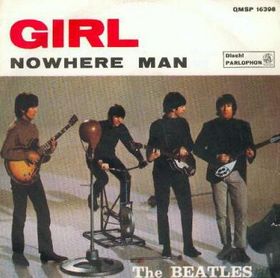
"Girl" is a song by the English rock band the Beatles from their 1965 album Rubber Soul. It was written by John Lennon and credited to Lennon–McCartney. "Girl" was the last complete song recorded for that album. "Girl" is considered to be one of the most melancholic and complex of the Beatles' earlier love songs.
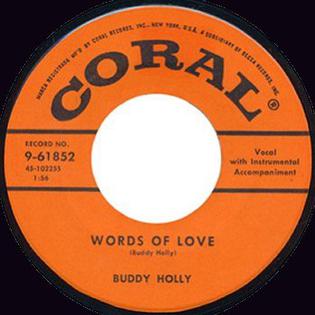
"Words of Love" is a song written by Buddy Holly and released as a single in 1957.
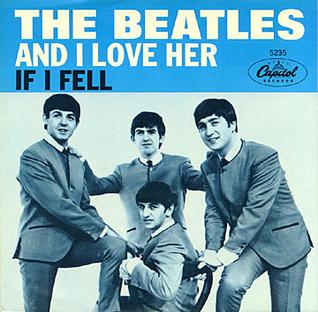
"And I Love Her" is a song recorded by English rock band the Beatles, written primarily by Paul McCartney and credited to the Lennon–McCartney partnership. It is the fifth track of their third UK album A Hard Day's Night and was released 20 July 1964, along with "If I Fell", as a single release by Capitol Records in the United States, reaching No. 12 on the Billboard Hot 100.

"Ask Me Why" is a song by the English rock band the Beatles originally released in the United Kingdom as the B-side of their single "Please Please Me". It was also included on their 1963 debut album Please Please Me. It was written primarily by John Lennon and credited to the Lennon–McCartney partnership.

"I'll Get You" is a song by the English rock band the Beatles, written by John Lennon and Paul McCartney, and released by the Beatles as the B-side of their 1963 single "She Loves You". The song was initially titled "Get You in the End".

"Don't Let Me Down" is a song by the English rock band the Beatles, recorded in 1969 during the Let It Be sessions. It was written by John Lennon and credited to the Lennon–McCartney songwriting partnership. The band recorded the song with keyboardist Billy Preston; the single release with "Get Back" was credited to "the Beatles with Billy Preston". Originally released as a B-side, producer Phil Spector excluded the song from Let It Be. However, it was eventually included on an alternative mix of the album, Let It Be... Naked.

"In Spite of All the Danger" is the first song recorded by the Quarrymen, then consisting of John Lennon, Paul McCartney, George Harrison, pianist John Lowe, and drummer Colin Hanton.
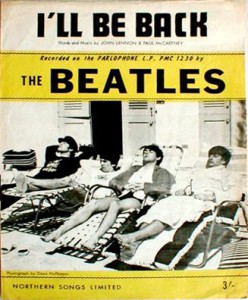
"I'll Be Back" is a song written by John Lennon, with some collaboration from Paul McCartney. It was recorded by the English rock band the Beatles for the soundtrack album to their film A Hard Day's Night (1964) but not used in the film. This song was not released in North America until Beatles '65 five months later.

"Sweet Little Sixteen" is a rock and roll song written and first recorded by Chuck Berry, who released it as a single in January 1958. His performance of it at that year's Newport Jazz Festival was included in the documentary film Jazz on a Summer's Day. It reached number two on the Billboard Hot 100, one of two of Berry's second-highest positions—along with Johnny Rivers cover of "Memphis, Tennessee"—on that chart. "Sweet Little Sixteen" also reached number one on the R&B Best Sellers chart. In the UK, it reached number 16 on the UK Official Charts. Rolling Stone magazine ranked the song number 272 on its list of the "500 Greatest Songs of All Time" in 2004. He used the same melody on an earlier song, "The Little Girl From Central" recorded on Checkmate in 1955.
"I'll Be on My Way" is a song written by Paul McCartney, credited to Lennon–McCartney, first released on 26 April 1963 by Billy J. Kramer with the Dakotas as the B-side of their hit debut single "Do You Want to Know a Secret", a song also written by Lennon–McCartney. The single reached number two in the UK charts while "From Me to You" by the Beatles occupied the number 1 position. The Beatles recorded a version of the song on 4 April 1963 for BBC radio, first released on the 1994 compilation album Live at the BBC.
"Hello Little Girl" is one of the first songs written by John Lennon, credited to the Lennon–McCartney songwriting partnership. Written in 1957, it was used as one of the songs at the Beatles unsuccessful Decca audition in 1962, included on the 1995 compilation album Anthology 1. A 1960 home demo recording has never been officially released.
"Hallelujah I Love Her So" is a single by American musician Ray Charles. The rhythm and blues song was written and released by Charles in 1956 on the Atlantic label, and in 1957 it was included on his self-titled debut LP, also released on Atlantic. The song peaked at number five on the Billboard R&B chart. It is loosely based on 'Get It Over Baby' by Ike Turner (1953).

"Glad All Over" is a 1957 song recorded by rock and roll and rockabilly artist Carl Perkins, "The Rockin' Guitar Man", at Sun Records in 1957. It was released as a 45 and 78 single, Sun 287, on January 6, 1958. It was written by Aaron Schroeder, Sid Tepper, and Roy Bennett. It is not the same song as the single "Glad All Over" released in 1963 by The Dave Clark Five.
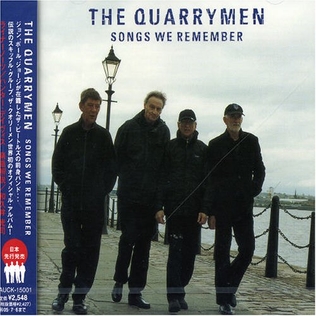
Songs We Remember is the third album by the re-incarnated version of the Quarrymen, which was the band that eventually evolved into the Beatles. It is also the final album to feature founder member Eric Griffiths before his death in 2005.

"Got to Get You into My Life" is a song by the English rock band the Beatles, first released in 1966 on their album Revolver. It was written by Paul McCartney and credited to Lennon–McCartney. The song is a homage to the Motown Sound, with colourful brass instrumentation and lyrics that suggest a psychedelic experience. "It's actually an ode to pot," McCartney explained. A cover version by Cliff Bennett and the Rebel Rousers, produced by McCartney, peaked at number six in 1966 in the UK. The song was issued in the United States as a single from the Rock 'n' Roll Music compilation album in 1976, six years after the Beatles disbanded. Another cover version by Earth, Wind & Fire from the Sgt. Pepper's Lonely Hearts Club Band film soundtrack peaked at number nine in the US in 1978.
References
- 1 2 3 4 "The Beatles Bible: Ooh! My Soul". 16 March 2008. Retrieved May 15, 2016.
- ↑ Moskowitz, David V. (2015). The 100 Greatest Bands of All Time. ABC-CLIO. ISBN 1440803404.